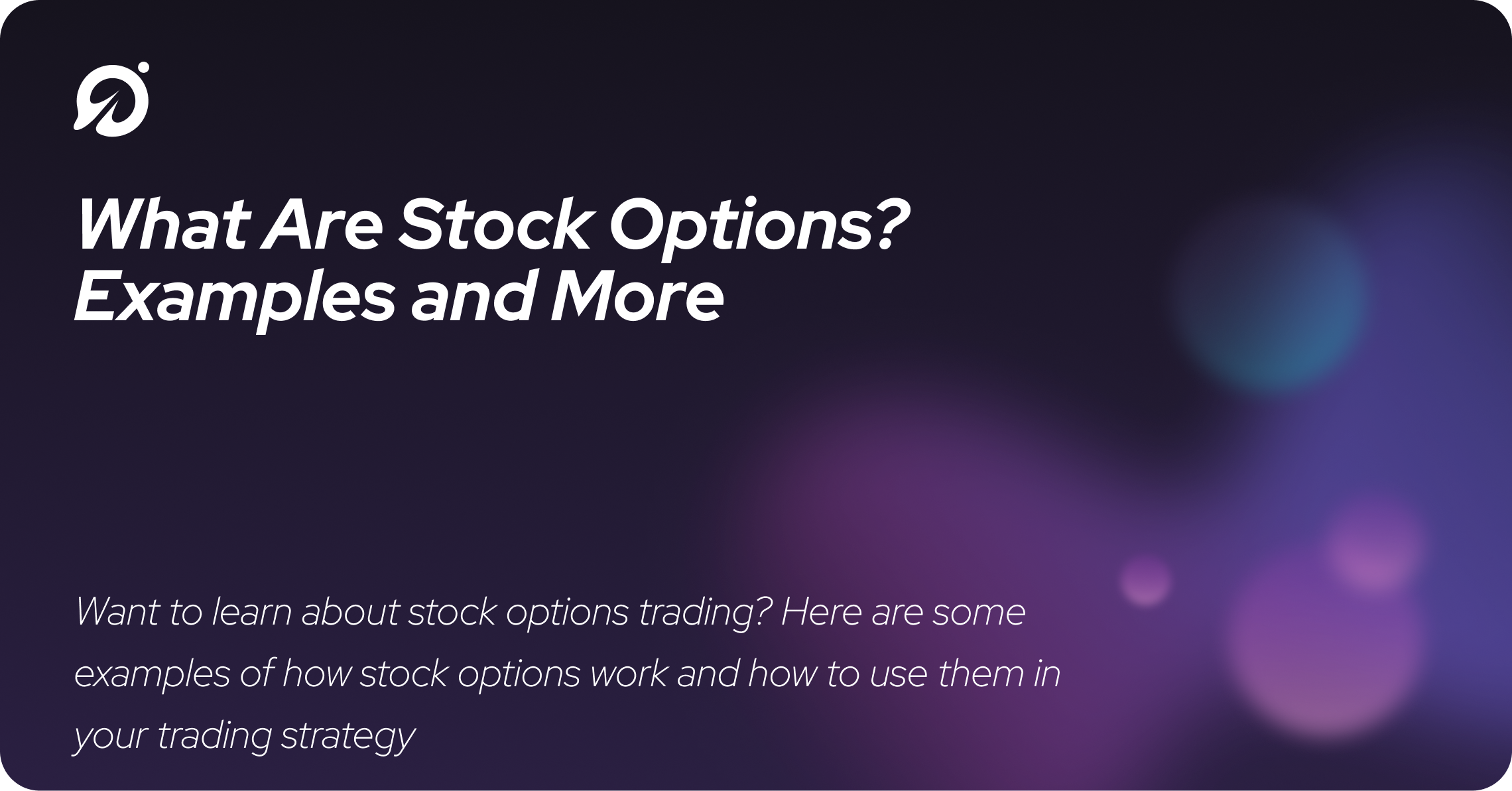What Are Stock Options? Examples and More
Want to learn about stock options trading? Here are some examples of how stock options work and how to use them in your trading strategy

Disclaimer: This is for informational purposes and is not meant to serve as financial or investing advice.
What Is a Stock Option?
Stock options are financial products that differ from regular stocks, indexes, and ETFs.
A stock option gives the investor the right, not the obligation, to buy securities at a predetermined price in a specific period of time. Usually, a security is a common stock in a company.
There are two types of stock options. “Puts” give the holder the right to sell the stock at a specific price. “Calls” provide the holder the right to buy the stock at a set price.
Options are also referred to as derivatives and equity options. It’s important to note that “employee stock options” are unrelated to employee benefits.
Understanding Stock Options
The most basic explanation of stock options is that calls are bets that the price of the stock will rise, and puts are bets that the stock price will fall.
They’re a tool for investors to increase or decrease their risk and reward on an investment thesis. If you think the stock will go up, you could buy aggressive options that give you a better upside than just buying the stock.
They’re also a way to hedge your trades. If you bought a stock that goes up, you could buy puts to hedge your trade and vice versa.
If you want to learn more about stock options or other trading terms, check us out on Youtube for hands-on explainers.
What Should I Know About Stock Option Parameters?
American vs. European Styles
American stock options are the most common type of options contract. You can exercise them at any time before expiration. Exercised just means the holder uses their right to buy or sell stocks.
You can only exercise European-style options on a specific date. These are less common in options trading. Often, European options are used for contracts made up of stock indices like the S&P.
Expiration Date
After the expiration date, the options are worthless. They can no longer be redeemed.
The option's market price may increase or decrease as it gets closer to the expiration date based on the stock price.
If a call option is close to expiration and the stock price is much lower than the strike price, it won’t be worth very much.
It’s imperative to verify the expiration date before buying options. LEAPs or Long-Term Equity Anticipation Securities are options that expire more than a year from the purchase date. They usually go up three or four years out.
Strike Price
The strike price, or exercise price, is the price at which the option allows you to exercise a trade. For example, if you think stock A will be trading above $100 in a month. You could buy a call option with a strike price of $100.
If the price goes up as you thought, the option contract gives you the right to buy the stock at a discount. You can immediately sell it for a profit.
But you don’t always have to exercise the option. As your option gets closer to maturity and it becomes clear that your prediction is correct, the option contract price will rise, and you can sell it to someone else who will exercise it.
Many complex options strategies involve strategically selected strike prices. For example, if you think the price of a stock will increase above $50, you may buy 10 contracts with a strike price of $50, 10 at $55, and $10 at $60.
If the price goes above $50, your $50 strike options will be in the money and can be sold for profit. Higher strike prices are riskier for calls, and lower strike prices are riskier for puts.
Contract Size
An options contract always represents the same number of shares. One call contract gives the holder the ability to buy 100 shares of stock. And one put contract gives you the ability to sell 100 shares.
You can buy as many options contracts as you want and don’t have to execute them. You can choose to execute some and sell some outright.
Premium
The premium is the price you pay for the option. You can find it by multiplying the price of the option times the number of contracts you bought times 100.
So if you bought two contracts to buy AMZN at $100 for $10 per contract, the premium is $1,000.
A higher volatility means a higher premium and vice versa.
What Are Some Trading Stock Options?
Okay, so we know what options are and the parameters that define them. Now, why and how would you trade them?
The Chicago Board Options Exchange (CBOE) is the most popular U.S. options exchange. But don’t worry; most stock brokers can facilitate options trading.
You must be approved for a margin account to trade options with most U.S. brokers. Approval is dependent on your account size and income. The process is different for every brokerage.
Because options grant you the right, not the obligation, to buy shares, the option itself has inherent value. If you buy calls and the price of the underlying stock increases above the strike price, the value of the option increases.
But, if a stock's price goes below the strike price, the call option’s value will decrease. The option is considered worthless if the price stays below the strike price through expiration.
That’s the considerable risk with options, they can become worthless, and all your initial capital is gone. If options look like they will expire worthless, you may have to cut your losses and sell the options for a loss.
But if your options are “out of the money” by a significant amount, they may be worthless before the expiration date.
What Are Option Greeks?
Once you understand the fundamental dynamics of options contracts, advanced traders use the Greeks to evaluate trades.
Because you can calculate the fair market value relatively reliably, a set of calculations and formulas can be used as indicators to buy or sell options.
Delta is the likelihood that an option will expire in the money (profit). Gamma describes how much Delta moves per point the stock price moves.
So if the stock goes up one point, that’s how much Delta will change. Theta measures how much an option's value decays over time. Vega measures how much an option's value varies due to large swings in stock price.
And finally, Rho helps the investor simulate how changes in inflation rates may affect options prices.
The Greeks are the bread and butter for institutional options traders. And while they may seem daunting, they can help simplify options for a beginner trader.
If you understand the greeks, you can quickly look at a snapshot of an option and understand the pros and cons of investing in it without doing any extra math or research.
But like all things, the greeks aren’t a silver bullet for investing. All market participants can access these calculations, so they are priced into the market.
What Other Kinds of Stock Options Are There?
As we mentioned earlier, employee stock options aren’t tradeable contracts but are a form of equity compensation that companies make to employees. Company stock options have a strict vesting schedule which is the amount of time you have to work until you earn the promised shares.
These stock options work to incentivize employees to stay aligned with the company over the long term.
Private companies and startups often offer stock option plans to employees before the stock goes public. These can be incentive stock options (ISOs).
ISOs are exempt from ordinary income tax, unlike non-qualified stock options (NSOs), which also incur long-term capital gains taxes when you sell. When the stock IPOs, the stock value is determined, and employees can realize a profit.
Often, employee stock options are crafted to minimize capital gains rates. Restricted Stock Units are stock options that haven’t been fully vested yet and can’t be sold.
The Bottom Line
Stock options are a great way to bet on stocks without being fully exposed to the underlying share price. They’re a tool to increase or decrease your risk-reward ratio without outright buying stock.
Your main takeaway should be that calls are a way to bet on the price of a stock going up, and puts are a bet on it going down. Sophisticated options traders use complex pricing strategies and systems to make optimal options bets.
But options are still a good tool for the ordinary trader. You don’t need a complicated system and quant to trade options.
That said, options are risky because their fair market value can go to zero. You should speak to a financial advisor and accountant before trading options.
There are lots of different tax treatments to consider. Depending on the option contract length, you may incur short-term capital gains or long-term.
Want to learn more about trading? Check out our blog on basic investing strategies.
Sources:
American Option Definition, Pros & Cons, Examples | Investopedia
What Is the Strike Price of an Option? Definition, Examples, and FAQ | TheStreet
